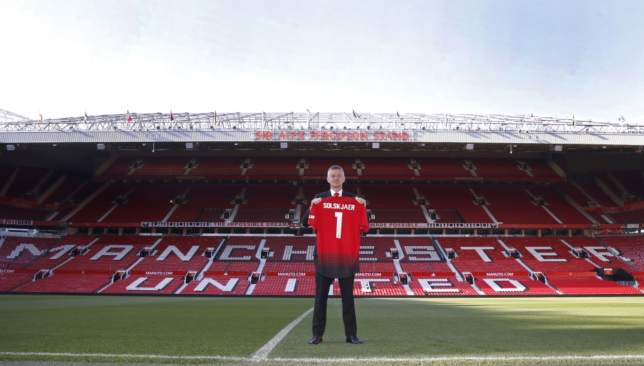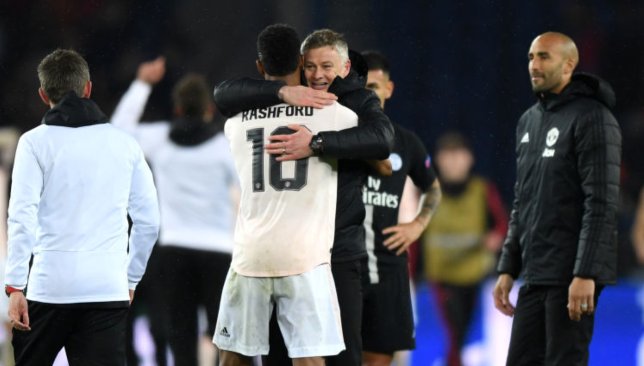
When Manchester United announced crowd favourite Ole Gunnar Solskjaer as interim manager in December the club insisted they would take their time before naming Jose Mourinho’s permanent successor.
It was the perfect scenario. The arrival of a friendly face in the shape of the smiling Solskjaer was sure to appease restless, frustrated fans, as well as a miserable squad of players on the verge, perhaps even in the throes of, mutiny under the mind-numbingly meandering and misguided tactics of Mourinho.
The club gave themselves a much-needed breather. Solskjaer would surely bring back the feel-good factor whatever the results and the powers that be had until the summer to plan properly for the future.
At the time it made absolute sense, but things have changed dramatically in the interim for the once interim boss.
Even the most optimistic of United fans would struggle to have dreamt up what has occurred since. Solskjaer has surpassed all expectations.
It started off slow. Five straight wins against Cardiff, Huddersfield, Bournemouth, Newcastle and Reading appeared a routine enough opening set of fixtures.
Elite mentality from the boss 👊 #MUFC
— Manchester United (@ManUtd) 28 March 2019
But factor in things like the 5-1 culling of Cardiff was the first time United had scored that many goals in a match since the final one of Sir Alex Ferguson’s tenure – an unforgettable and highly dramatic 5-5 draw against West Brom on the final day of the 2012/13 season.
Last season, on Tyneside, an insipid United succumbed to a dismal 1-0 defeat to the Magpies – it was one of the worst performances of the Mourinho era. In October 2017, United were easily outfought against the tireless Terriers as Huddersfield earned a 2-1 league win.
Critics talked of more arduous tests to come, yet most United fans had trouble believing the perturbed Portuguese would have emerged from that initial period with five victories.
The bandwagon rolled on. Solskjaer and United passed their first big test as big six rivals Tottenham were beaten at Wembley – the presumed tactically inept Solskjaer earned praise, although the Teflon display of David De Gea also played a huge role in victory.
Critics were still not convinced, but then Brighton – a 3-2 defeat against the soaring Seagulls on the south coast may well have been Mourinho’s lowest ebb in the second game of the season – fell, before Arsenal were dismantled by another tactically impressive counter-attacking performance reminiscent of the old United in the FA Cup fourth round.
Three was the most amount of straight wins Mourinho’s men had mustered all season. The 3-1 win over the Gunners made it eight successive victories for Solskjaer – now firmly at the wheel.

Solskjaer’s shining moment was beating PSG to go through to the Champions League quarter-finals where they face Barcelona.
Defeat finally arrived in his 12th game, first-half injuries to Anthony Martial and Jesse Lingard saw United steer to a 2-0 home defeat against Paris Saint-Germain in the first leg of their last 16 tie. It seemed the end of the European dream. Yet that result was effectively rendered inconsequential when Solskjaer enjoyed his finest hour to date – a 3-1 win in Paris unfathomably saw the new skipper navigate his side into the Champions League quarter-finals.
Up until that point, Solskjaer’s reign had provided plenty of positives. But Red Devils fans weren’t thinking too much about the future, they were just happy to be seeing adventurous, attacking football once again.
But a special night in the French capital as the rain teamed down suddenly evoked memories of old. This was the old United, the proper United.
Back-to-back defeats have since followed to Arsenal and Wolves – the Gunners subsequently leapfrogged United into the last Champions League spot while the Molineux loss saw them fail to reach the FA Cup semi-finals.
But United have acted and, as club football returns following the international break, United have their fourth permanent boss in five-and-a-half years.
Initial plans meant he wasn’t supposed to be in place for another three months, and that he would most likely be South American, not Scandinavian.
But 14 wins in 19 games is impressive and has seen United shift tact. It borders on miraculous given where United’s season was heading.
It gives the Norwegian a win rate of 73.7 per cent. To put that in context, he is the most successful manager in club history – and by some distance. Ferguson trails some way behind with a win percentage of 59.67.
Mourinho (58.33), Louis van Gaal (52.43) and David Moyes (52.94) all lie in his wake. His average points per game (2.46) is also far superior to Ferguson (2.16), Mourinho (1.89), Van Gaal (1.79), Ryan Giggs (1.75) and Moyes (1.68).
Congrats boss 👊🏾 pic.twitter.com/GCyOQN5Ioe
— Marcus Rashford (@MarcusRashford) 28 March 2019
He is also way superior compared to his big six counterparts. Mauricio Pochettino’s win rate at Tottenham is 56.7 per cent, Jurgen Klopp’s at Liverpool 57.35 (although that stands significantly higher at 73.33 per cent in the Premier League this season), Unai Emery’s at Arsenal is 62.2, Maurizio Sarri 64 per cent at Chelsea with Manchester City manager Pep Guardiola closest to Solskjaer with a 71.6 per cent (up to 80 in the league this season) win rate.
Of course, this needs to be put in context. All three of Solskjaer’s predecessors won at least one trophy – yes we have to include Moyes’ Community Shield triumph. Van Gaal departed having delivered a maiden FA Cup in 12 years. Mourinho lifted the Community Shield, League Cup and a maiden Europa League title.
Also, Solskjaer has managed just 19 games, Pochettino has led Spurs in 263. But in that run, the skeptics have largely been silenced.
Former United midfield lynchpin Paul Ince seemed unimpressed with United’s revival under Solskjaer when he said in January: “Anyone could have gone in and done what he has done, it wasn’t a hard thing to do to give those players freedom and improve the mood.
“I think I could have gone in at the time. They needed someone to rest the ship, I think I could have done that.”
His words now live in infamy as Solskjaer has cleared hurdle after impressive hurdle.
Whereas in December it was sensible to bring in a familiar face and give him the reins until the summer, appointing Solskjaer permanently is now what makes the most sense.
One of the major things United have been unforgivably guilty of in the years since Ferguson retired is inaction. Especially when it comes to transfers.
Moyes bungled the pursuits of Cesc Fabregas and Toni Kroos in his first months and was left to pay over the odds for Marouane Fellaini.
Van Gaal excited United fans by attracting Radamel Falcao and Angel Di Maria to Manchester – their acquisitions proved false dawns and they were shortly on their way.
Mourinho’s appointment almost guaranteed silverware and, although he won three trophies in two-and-a-half years, he failed to deliver the coveted Premier League title, or even lay a glove on City – the 19-point margin to runners-up United last term was the largest in Premier League history.
Ole’s at the wheel, congrats boss! 👊🏽👏🏽 pic.twitter.com/HPw3zCVv8j
— Chris Smalling (@ChrisSmalling) 28 March 2019
Despite silverware, he was the manager who perhaps did most of the damage. A highest league finish since Ferguson left last season was thrown into complete disarray as he self-destructed. He seemed to dismiss a title challenge in pre-season and a lack of backing in the transfer market lit the fuse for an explosive collapse that blew up just before Christmas.
Wait until the summer and United would risk falling further behind the likes of City and Liverpool. Were an appointment to be made in June, he would already be playing catch up. Not to mention, perceived top target – Pochettino – would be both a laborious, costly and potentially fruitless pursuit.
The way the club has gone about it, Solskjaer now has every chance to continue his good work. While the possibility of silverware seems remote – another miracle must surely be conjured to get past Barcelona in the last eight of the Champions League – he has injected hope and belief back into this squad.
The players know now who will be in charge next season – which could prove pivotal in the future of talisman Paul Pogba, who despite being happier, remains a target for Real Madrid.
Solskjaer can now plan for pre-season, an assault on the transfer market and turning United into Premier League contenders next year instead of preparing for a return to the Eliteserien with Molde.
It’s a fearless and forthright statement of intent by United and it could reverse years of fragility and fumbling around.